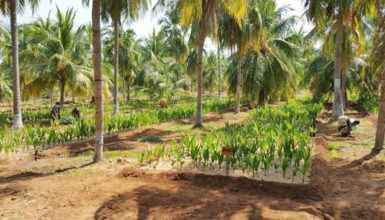By R F Trotz
NSP Chairman, Guyana
At the end of the last installment (SN August 05, 2016) I stated that the task at hand was “transforming the production base from illustration A to B as the basis for developing value chains.”
The second picture illustrates space available for intercropping being utilized for coconut seedling production.
The production of seedlings is one critical factor for implementation of any revitalization process.
Its importance was highlighted last Thursday, August 11, at a small forum hosted by Moray House when a prominent cane farmer with 62 acres expressed an interest in investing in coconuts as a possible alternative to sugarcane. He lamented not being able to source enough seedlings from the National Agricultural Research and Extension Institute (he got 20).

This element of improving production and productivity is contained in the second of four major outcomes listed in Phase One of the International Trade Centre/Caribbean Agricultural Research and Development Institute (ITC/CARDI) led project currently in operation. It requires not only mass production of seedlings but careful selection of suitable varieties required to drive the value chain.
The value chain concept is essential for revitalizing the industry. It is a market driven approach where investment decisions are based on research of demand patterns for specific products.
A comprehensive research was done in August 2015 in keeping with the first objective identified in the May 2015 stakeholder meeting. Four main products were identified by Guyanese stakeholders: coconut oil (virgin, crude and refined), coconut water; coir products and activated charcoal.
There are different varieties considered more suitable for these products – hence the importance of selecting varieties according one’s business plan.
In addressing the task of developing the industry, the May 2015 Stakeholders meeting arrived at six working areas for formulating a strategy:
- Develop a business plan for the sector and profitability studies to support commercially driven development and value addition;
- Consolidate sector demand and plan supply;
- Improve access to finance and promote innovative schemes that respond to the needs of the sector;
- Improve research for availability and multiplication of right varieties for planting;
- Promote better farming practices and extension services to increase productivity and improve pest and disease management;
- Improve organisation of coconut supply through an industry alliance between value chain stakeholders to promote organisation, planning, information flows and policy support.
This task requires many shoulders to the wheel. The NSP Terms of reference lists them as including:
Revitalizing the Coconut Industry in Guyana Small coconut farmers, plantation operators, owners and workers, coconut producing and processing communities, women and youth in the coconut industry, coconut products manufacturers and input suppliers;
- Policy-makers, producer organisations, government agencies involved with the coconut sector, research and development and extension services;
- Agri-trade support services, businesses in product development and trade, services in support of food safety, and finance support services. In addition, regional development institutions, including, but not limited to Caricom, CARDI, the University of the West Indies, Inter-American Institute for Cooperation on Agriculture, CCS, CEDA, the Food and Agriculture Organization, and the Caribbean Export Development Agency, which are working to strengthen capacity for delivering support services to small producers and processors shall be able to participate on a non-membership basis but as a technical secretariat for the NSP.
- CARDI will also act as the National Focal Point for the NSP in collaboration with a designated ministry in order to provide secretariat support and coordination work.
Hence, effective and meaningful stakeholder involvement is considered essential for implementing the strategy identified by them.
Equally essential is the support services required from governmental and non-governmental agencies.
The concern for ensuring that projects are stakeholder driven is critical for growth through the private sector and any re-awakening of the cooperative sector.
The current project is founded on this conviction. Future columns will focus on some of the challenges faced by stakeholders—especially in terms of collective efforts to build alliances in the competitive world of agribusiness—and current efforts in this regard.





